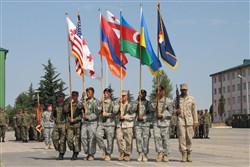Belarus
Print-ready fact-sheet
Capital: Minsk
Area: 207,600 sq km
Comparative area: slightly smaller than Kansas
Population (July 2011 estimate): 9,577,552
Official language: Russian and Belorussian, though Russian is predominant
International Organizations and Agreements: Commonwealth of Independent States (CIS - a group of 12 former Soviet republics), Belarusian and Russian Union State, Collective Security Treaty Organization (CSTO), Organization for Security and Cooperation in Europe (OSCE), North Atlantic Treaty Organization's (NATO) Partnership for Peace, North Atlantic Cooperation Council
Direct military to military cooperation with the U.S. continues to be minimal. Belarus currently has no International Military Education and Training (IMET) program, and bilateral exercises and cooperation are nonexistent; the only program that is still functional is the attendance of Belarusian military officers at George C. Marshall Center programs. The U.S. continues to support Belarus' adherence to arms control agreements and treaties into which it has previously entered, including the Open Skies Treaty, which Belarus ratified in 2001. Belarus has cooperated with the North Atlantic Treaty Organization, through the Partnership for Peace Trust Fund, to destroy a total of 700,000 conventional land mines.
The Ministry of Defense is experiencing success in the area of military reform. Planned changes include combining the Air and Air Defense Forces, downsizing the force structure about 30% from 83,000 to 60,000, transitioning from a conscript to a contract force, and modernizing the command and control structure by creating a Ground Forces Command between the Ministry of Defense and the units in the field.
There have been numerous reports of Belarusian sales or delivery of weapons or weapons-related technologies to states of concern, including state sponsors of terrorism. Belarus was previously a recipient of assistance under the U.S. Defense Department's Cooperative Threat Reduction (CTR) Program, whose objective is to reduce the threat posed to the United States by weapons of mass destruction remaining on the territory of the former Soviet Union by promoting denuclearization and demilitarization and preventing weapons proliferation. However, due to the Belarusian authorities’ poor record on human rights, they were de-certified and are no longer recieving assistance.


EUCOM Social Media Links